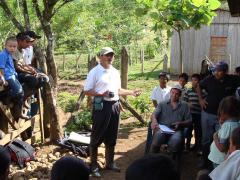APLV: Home-Grown Leadership
Esteban Cantillano is one of the amazing success stories of APLV. In 1993 he was a campesino living in a little, remote village where APLV was developing a potable water project. He was elected the coordinator by the community, so was responsible for all the interface with the community. But he asked a pile of questions of the brigade from UC Berkeley that was putting in the system! He wanted to know about everything. He was eventually invited to join the first class of the "Potable Water Technical School", a technical high school program, but protested that he had only finished the 6th grade. They said "well, try it out - we'll take you on probation." That was in 1993. Needless to say, he finished with honors (and later went back and did his 7th-10th grade education!) and became one of the pillars of APLV. He has served in the technical/design role he was trained for, as the social coordinator (who does the contact with the village, local government, landowners, and the like), and is now in charge of the office here in Rio Blanco. He seems to know everybody, and to know everything about every project ever constructed by APLV.
Esteban is just one example of the depth of leadership that we've found here. All but one of the workers here is Nicaraguan, and they have a combined total of decades of experience with the organization. Many times an organization like this is directed from outside the country, and the workers are just salaried workers, doing the best they can, but for them it's a job. In this case we have local people who are fully invested in the past, present, and future of the organization. We're pretty optimistic about the future.
Agua para La Vida's in-country director is Carmen Gonzalez, who has been here for 3 years after 15 years with Habitat for Humanity, where she was involved with the building of hundreds of houses for needy Nicaraguans. In keeping with APLV's philosophy of putting money into projects rather than into comfortable surroundings and administrative costs, Carmen runs the national office out of her small house in Managua, with no administrative help, just her. She spends 2-3 weeks each month in Rio Blanco (four hours away by bus) living in the very modest home where we're staying right now (outhouse, running water and electricity but no hot water).
Her vision is to change APLV from an isolated organization dependent on aid from a few donors in the US and France into a robust, Nicaragua-centered NGO (the techie term for Non-Government Organization, or charity working in country). She's trying to establish new and sustainable funding sources and is trying to establish links with many other NGOs and to do joint projects, etc.
We certainly applaud this approach - when we were working with Friendship Bridge in Guatemala we went to one village where the women were all telling us that their young children were ill. They said that almost every child under age 2 was perpetually sick. But Friendship Bridge is a microfinance organization and at least the on-the-ground workers have no idea what health resources might be brought into play for this group. This seems to be a constant problem in Central America (and perhaps throughout the developing world) and so we certainly applaud the idea of building ways to solve problems which may be outside the purview of any particular organization.
Carmen also wants to make sure that APLV, while maintaining its efficiency and humility, can perform at the level of professionalism required by the various funding sources. They might be a great organization, but if they can't demonstrate that to a particular NGO funding source by showing that they execute in a professional manner, that fact could cut them out of the ability to do a number of projects.

